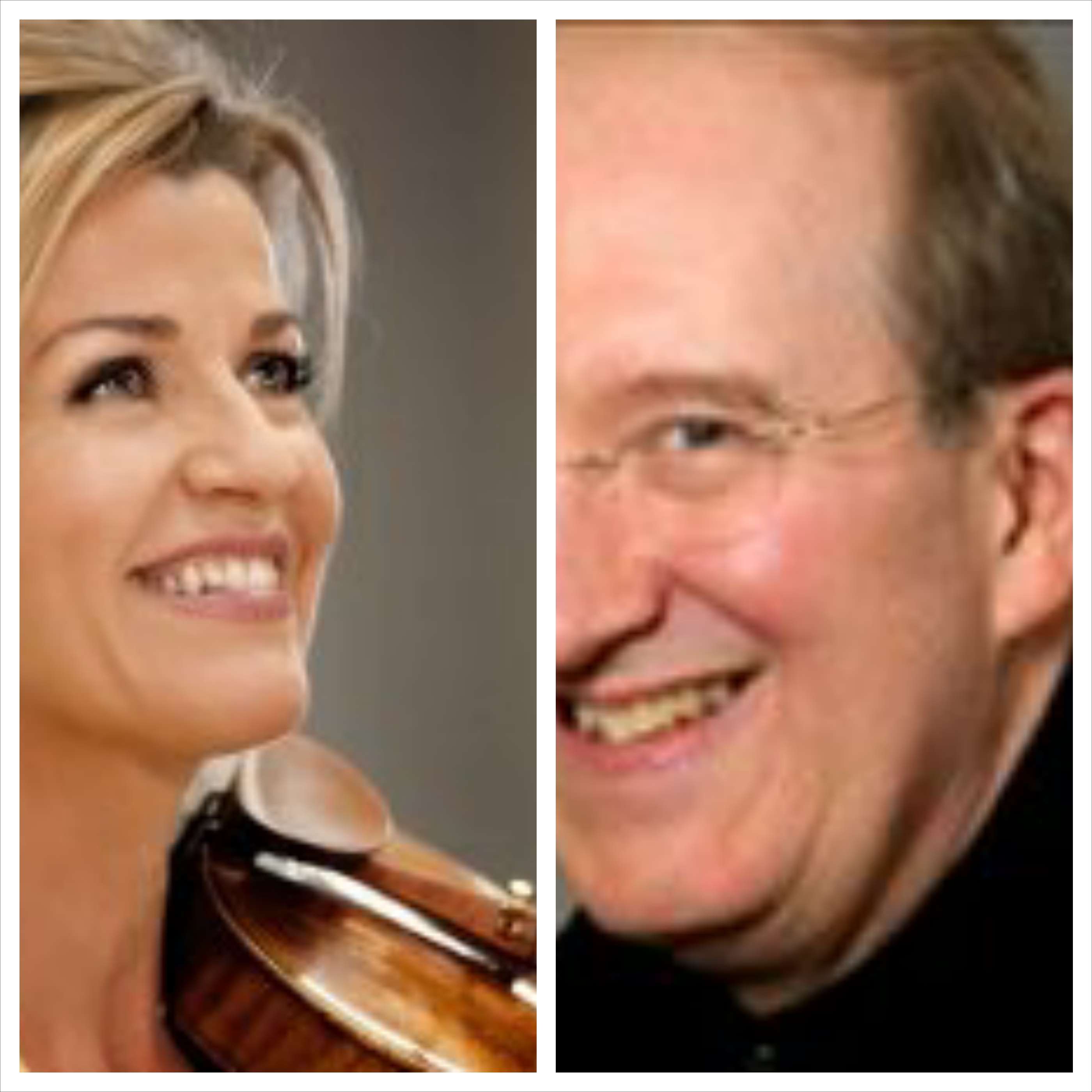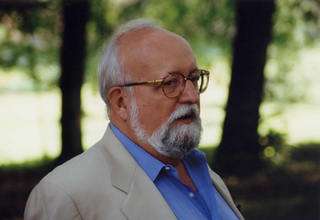|
Back
The Daring Duo in a Daring Program New York
Isaac Stern Auditorium, Carnegie Hall
12/14/2013 -
Witold Lutoslawski: Partita for Violin and Piano
Franz Schubert: Fantasie for Piano and Violin in C Major, D. 934
Krzysztof Penderecki: La Follia for Solio Violin (World Premiere)
André Previn: Sonata for Violin and Piano No. 2 (World Premiere)
Camille Saint-Saëns: Sonata for Violin and Piano No. 1 in D Minor, Opus 75
Anne-Sophie Mutter (Violin), Lambert Orkis (Piano)

A.-S. Mutter/L. Orkis (© picture-alliance-dpa/Allmusic.com)
The official description of this recital was “Celebrating the 25th Anniversary of (the Mutter/Lambert) artistic partnership and Carnegie Hall Recital Debut”.
That exegesis was superfluous. The partnership of Anne-Sophie Mutter and Lambert Orkis is a celebration by itself. No further description was necessary.
And since this is the season of giving, Ms. Mutter turned Carnegie Hall into her own Christmas tree, showing the audience with gifts and surprises that glowed, glittered, surprised, and tantalized.
Forget your usual violin recital. Ms. Mutter gave us no less than two world premieres from eminent composers, she produced the composers themselves from the audience, she gave the New York premiere of a Partita by the late Witold Lutoslawski, who had reveled in her original performance. She played a rare work by Schubert and a sonata by Camille Saint-Saëns which had been lauded by Marcel Proust.
And just to show that she was more than a magician with music unknown, she encored with the simple elegance of a familiar Brahms Hungarian dance and Dvorák’s Humoresque.
The greatest two gifts of the evening, though, were Anne-Sophie Mutter and Lambert Orkis themselves. Other violinists have the tone, the technique, the understanding. But only Ms. Mutter has all of this, plus that very special sweep which envelops all that she plays. At times her interpretations of the familiar may seem radical (like her recent Bach), yet she is never idiosyncratic for its own sake and has the scholarship to back her up.
Her relationship with Lambert Orkis is equally unique. Mr. Orkis could have been one of the great soloists of our time, but in working with other musicians–and especially with Ms. Mutter when she plays music of our time–he has that same span of the keyboard. When he raises his hands ready to come down like a hawk on the notes, it is a of consummate awareness.
Last night, two of the five works were by composers who were in the audience, one was by a composer who of living memory, and the two composers of the 19th Century had pieces infrequently played.
The Schubert Fantasy is almost a whole sonata by itself, but perhaps because the composer was working with music he had previously composed, he begged off the title. These were lovely songs, played as a vocal interpreter by Mr. Orkis, with Ms. Mutter commenting, playing around the edges and always ready to allow the piano to continue with Schubert’s melody.
The Saint-Saëns sonata, created by a man who loved the violin and wasn’t afraid to show his passion, has a special meaning for Proustians. Not only is the fictional composer Vinteuil based on the very social Saint-Saëns, but the second theme of apparently this sonata was for Swann In Love like a leitmotiv for Swann’s passion all the way through that novel.
Ms. Mutter showed her penchant for melody, for the easy figurations, and that ineffable tone to the very last tarantella.
Onto our own century. While not married to her now, André Previn’s musical affection for his wife has never changed, and several works are devoted to her. Last night’s Sonata had few of his American trademarks. It was almost sternly Brahmsian, the themes were strictly melodic, the emotions kept within bounds. The last movement, a “quasi-cadenza”, was not for the violinist alone. Both pianist and violinist almost outdid themselves in their fireworks.
But when it came to the most unique partnership, nothing could top Witold Lutoslawski’s Partita, which had been arranged for Ms. Mutter with orchestra. The original music, though, shows just what had been hinted at the night before in the all-Lutoslawski program. The idea of “aleatory control.”
This is difficult to hear with the orchestra. But with piano, one hears both soloists not fighting for attention, but going their own way with the same musical gestures until coming together at the right cadences.
Moreover, this was a work of real humor, with piano and violin not only imitating the Baroque musical form buty mimicking each other, “talking” like babies or, at the end, playing an unashamed crescendo rising up and down the scale.
Alas, Mr. Lutoslawski would have been one-hundred years old, but he had heard Anne-Sophie Mutter play it and was rightfully astonished.

K. Penderecki (© P. Anderson)
Krzysztof Penderecki is a mere 80 years old, and his frequent trips to New York are always a blessing. He was of course present for the world premiere of his La Folia for solo violin, and its celebrant must have done him proud.
This was not the famous Corelli Folia, but a new theme, seeming to use the same long-short-long rhythms, and the chordal progression of the old tune, starting with a series of pizzicato leaps. From here, Ms. Mutter followed with the most intricate variations, using the most dazzling violin mechanics, yet making them sound anything but mechanical. They dazzled because they were so new, so impetuous and finally so true to the original theme, which returned after a mere ten minutes, resting on a low F.
Two things. The composer originally wanted to this piece a “chaconne”, but said that competing with Bach’s D Minor Chaconne for solo violin “would be chuzpah” (Nonsense. Bach was not a “progressive”, but he would have understood the structure immediately.
Second. In the Symphony Space concert devoted to his music, Mr. Penderecki confessed that he demands the utmost virtuosity from all his musicians. He is a gentle and courtly soul in person, but one doubts that he would take anything second-rate in his own compositions.
In Anne-Sophie Mutter, he had nothing to fear for she and Mr. Orkis are seemingly fearless. And their sounds last night transformed the fierce snow, sleet, rain and slush outside Carnegie Hall into an evergreen forest of sprites and spirits and joy.
Harry Rolnick
|